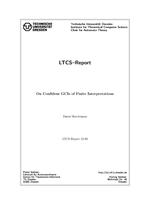LATPub713: Unterschied zwischen den Versionen
Aus International Center for Computational Logic
Marcel Lippmann (Diskussion | Beiträge) KKeine Bearbeitungszusammenfassung |
Marcel Lippmann (Diskussion | Beiträge) KKeine Bearbeitungszusammenfassung |
||
| Zeile 15: | Zeile 15: | ||
}} | }} | ||
{{Publikation Details | {{Publikation Details | ||
|Abstract=In the work of Baader and Distel, a method has been proposed to axiomatize all | |Abstract=In the work of Baader and Distel, a method has been proposed to axiomatize all general concept inclusions (GCIs) expressible in the description logic EL^bot and valid in a given interpretation I. This provides us with an effective method to learn EL^bot ontologies from interpretations, which itself can be seen as a different representation of linked data. In another report, we have extended this approach to handle errors in the data. This has been done by not only considering valid GCIs but also those whose confidence is above a certain threshold c. In the present work, we shall extend the results by describing another way to compute bases of confident GCIs. We furthermore provide experimental evidence that this approach can be useful for practical applications. We finally show that the technique of unravelling can also be used to effectively turn confident EL_gfp^bot bases into EL^bot bases. | ||
general concept inclusions (GCIs) expressible in the description logic EL^bot and | |||
valid in a given interpretation I. | |||
to learn EL^bot ontologies from interpretations, which itself can be seen as a | |||
different representation of linked data. | |||
this approach to handle errors in the data. | |||
considering valid GCIs but also those whose confidence is above a certain | |||
threshold c. | |||
another way to compute bases of confident GCIs. | |||
experimental evidence that this approach can be useful for practical | |||
applications. | |||
used to effectively turn confident EL_gfp^bot bases into EL^bot bases. | |||
|ISBN= | |ISBN= | ||
|ISSN= | |ISSN= | ||
| Zeile 46: | Zeile 34: | ||
year = {2012}, | year = {2012}, | ||
} | } | ||
}} | }} | ||
Version vom 23. März 2015, 13:24 Uhr
On Confident GCIs of Finite Interpretations
Daniel BorchmannDaniel Borchmann
Daniel Borchmann
On Confident GCIs of Finite Interpretations
Technical Report, Chair of Automata Theory, Institute of Theoretical Computer Science, Technische Universität Dresden, volume 12-06, 2012. LTCS-Report
On Confident GCIs of Finite Interpretations
Technical Report, Chair of Automata Theory, Institute of Theoretical Computer Science, Technische Universität Dresden, volume 12-06, 2012. LTCS-Report
- KurzfassungAbstract
In the work of Baader and Distel, a method has been proposed to axiomatize all general concept inclusions (GCIs) expressible in the description logic EL^bot and valid in a given interpretation I. This provides us with an effective method to learn EL^bot ontologies from interpretations, which itself can be seen as a different representation of linked data. In another report, we have extended this approach to handle errors in the data. This has been done by not only considering valid GCIs but also those whose confidence is above a certain threshold c. In the present work, we shall extend the results by describing another way to compute bases of confident GCIs. We furthermore provide experimental evidence that this approach can be useful for practical applications. We finally show that the technique of unravelling can also be used to effectively turn confident EL_gfp^bot bases into EL^bot bases. - Bemerkung: Note: See http://lat.inf.tu-dresden.de/research/reports.html.
- Forschungsgruppe:Research Group: AutomatentheorieAutomata Theory
@techreport{ Borc-LTCS-12-06,
address = {Dresden, Germany},
author = {Daniel {Borchmann}},
institution = {Chair of Automata Theory, Institute of Theoretical Computer Science, Technische Universit{\"a}t Dresden},
note = {See http://lat.inf.tu-dresden.de/research/reports.html.},
number = {12-06},
title = {On Confident GCIs of Finite Interpretations},
type = {LTCS-Report},
year = {2012},
}
